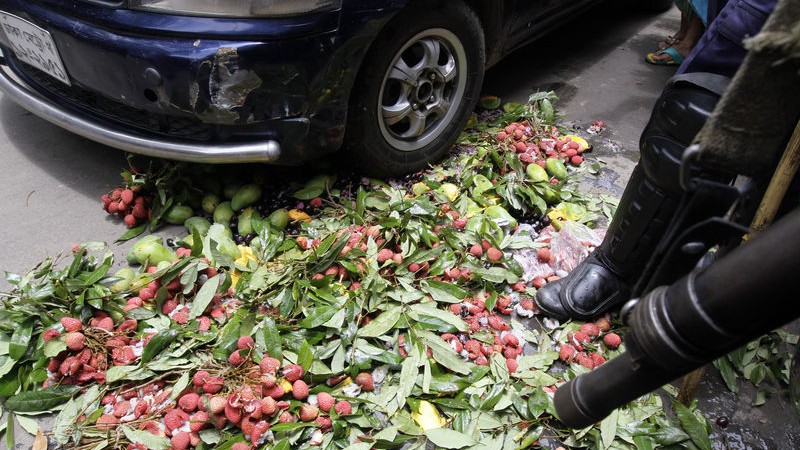 |
| Dhaka Metropolitan Police jointly conducted a drive at Hatirpul Bazar against the chemical formalin. Image by Reaz Sumon. Copyright Demotix (3/6/2014) |
The sweet, fleshy mango is especially sought after, but this year the fruit is harder to find due to a police drive to control the misuse of formalin, a strong solution of formaldehyde used to preserve produce (traditionally used to preserve dead bodies). Last month, police set up mobile formalin-detection units, confiscating and destroying truck loads of locally produced and imported fruits.
Fruits can naturally contain 0.03-0.15 part per million (ppm) of formalin, but the police drive against formalin, which primarily targeted the seasonal fruits, found the level between 3.5 ppm to 46 ppm in fruit found at markets in the country's capital Dhaka. There, police set up checkposts at entry points into the city to check for contaminated fruit.
Formaldehyde is highly toxic. Ingesting only 30 mL of a solution containing 37 percent formaldehyde can kill a human. In the past few years in Bangladesh, formalin has been used without limits on vegetables, fruits, meats and other putrescent foods to prevent them from rotting. On 30 June, 2014, the country's cabinet approved a draft law that calls for a maximum punishment of life in prison and a hefty fine for formalin abuse and unauthorized trading.
Journalist and blogger Anis Raihan at Istishon blog described how mangoes are treated with formalin:
When the mangoes are plucked they are sprayed with the first dose of formalin. Then they are packed and transported to the cities. The first dose is to cover the delays in the transport to prevent them from rotting. After arrival the traders check whether the mangoes are intact or show signs of rotting and spray another dose if necessary to keep them fresh till they are distributed to retailers, who start to sell the mangoes as they receive them. However, if the mangoes show signs of rotting when they are received, the retailers spray another dose of formalin.Fruit sellers haven't been happy about their loss of produce. In the port city Chittagong, the fruit sellers association went on strike for several hours, claiming that police have been harassing them by testing the fruits with inadequate machines.
Contaminated food is an issue in Bangladesh. In 2012, the deaths of 14 children in Dinajpur after eating lychees tainted with pesticides sparked uproar in the country.
A recent study conducted by the Bangladesh government and Food and Agriculture Organization (FAO) of the United Nations showed that in Bangladesh more than 40 percent of foods contains banned pesticides. Toxic substances in the food samples were three to 20 times the limits set by the European Union. In the same report, 50 percent of vegetables and 35 percent of fruits have been declared unsafe. The mango and fresh shrimp samples contained the highest level of formalin.
 |
| Police destroying fruit contaminated with formalin. Image by Reaz Sumon. Copyright Demotix (3/6/2014) |
Blogger Kobid shared a shocking statistic related to contaminated food in Bangladesh:
Each year almost 5.7 million people face health hazards due to adulterated food. According to statistics from the Bangladesh Bureau of Statistics, almost 40 percent of deaths in 2010 were due to illness caused directly or indirectly by adulterated food.
Shahadat, a blogger, didn't mince words in describing the people who sell food contaminated with unsafe chemicals:
Not only in human food, adulterating food for any living being is cruel. The people who resort to this slow poisoning are not humans, but human-like animals.But the issue is a little more complicated than that. As writer and columnist Tahmina Anam pointed out in The New York Times, the rural poor are the ones growing the fruit, which are then sold in urban areas. Transport is costly for small growers and risky because of non-air-conditioned trucks and road delays caused by traffic jams, strikes or road conditions. Formalin ensures they won't lose their produce, but at the cost of people's health.
Tighter regulations on the chemical’s use will solve the adulteration problem today, but not the transport issues — and growers’ desire for a workaround, chemical or otherwise.
The post was first published in Global Voices
























0 comments:
Post a Comment